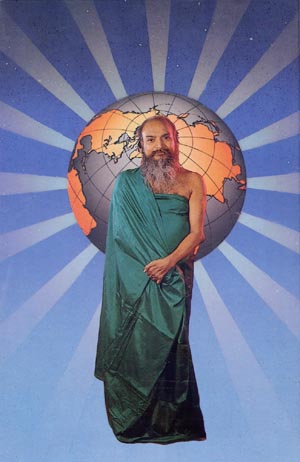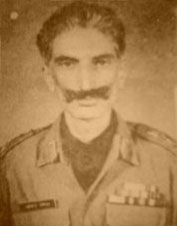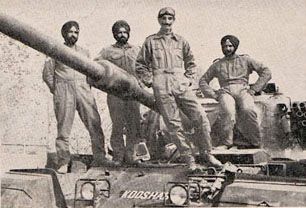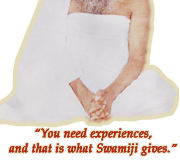The Global Work

We know some things about Shivabalayogi’s public work, his public programs, initiation into meditation, bhajans and bhava samadhi. We know about our own experiences and those of other devotees.
We know a lot less about Shivabalayogi’s role preventing world war, although he did talk about the yogis’ role of protection, and the dangers of nuclear tensions.
Wars with India
Shivabalayogi sat in tapas at the Bannerghatta ashram in Bangalore several times in the 1960’s and 1970’s. It was publicly known at the time that his purpose was to protect India and world peace. One forty day tapas was done on the occasion of the Indo-Pakistan War of 1965 and another forty days in connection with the Indo-Pakistan War of 1971. When war broke out between India and China, again he went into meditation. In each case, the hostilities ceased after a few days or weeks.
Shivabalayogi sat in tapas for one year for word peace, beginning on the 7th of August, 1968. A crowd numbering in the tens of thousands gathered to witness him emerge. See the One Year Tapas video online.
Kuwait & World War
Shivabalayogi was captured in Kuwait in 1990 when it was invaded by Iraq. You can read an eyewitness account in Escape from Kuwait. After his escape, he told newspaper reporters and devotees:
“Earlier I declared that I shall be personally present at the place where the war would break out. It happened. ... These experiences are quite normal for yogis.”
Protection from War
A personal account of action in the two-week war between
India and Pakistan, December 3-16, 1971
by Lt. Gen. Hanut Singh (ret.)
More about
Gen. Singh
The 1971 War between India and Pakistan
Before the action in 1971, I had called Swamiji to tell him I was leaving. I wanted His blessings. I couldn’t tell him that we had been mobilized and were leaving for the front. This was all very secret information. I simply told Him that “Swamiji, I am going.”
Swamiji immediately understood that we are going to the front. Swamiji said, “shervad [Blessings].” I had my blessing.
Subsequently, when we came back, Swamiji told me that when he had received this call of mine and he understood that we are likely to go to war, he had sat in dhyana. That continued until well after the cease fire with the idea to re-establish peace in the subcontinent.
When we had started off we anticipated that it was going to be a fight to the finish and it may be a very long, drawn out war. In fact, on the 16th itself only I came to know that a cease fire had recently been unilaterally declared by Mrs. Gandhi. We were at that time in the thick of very severe battle and one of my NCO’s who had gone to get a replacement tank for my regiment, he drove up and he told me over the radio that our prime minister declared a unilateral cease fire this evening. That’s how we came to know that a cease fire was in the offing. Otherwise, we couldn’t imagine a cease fire coming in so early. We had geared ourselves, mentally and otherwise, for a long conflict lasting a month or so.
I have no doubt that it was Swamiji’s dhyana or tapas that he sat in that brought about an abrupt end to hostility, that he established peace in the subcontinent.
During the Indo-Pak War of 1971, I experienced the supreme benediction of my Guru’s Grace. This is the story.
By about October of 1971, it was evident to even the most casual observer that the issue of Bangladesh could not be peacefully resolved. At the time I was commanding my Regiment, the Poona Horse, and it became evident to me that we would soon be at war with Pakistan.
War is the supreme test of a human being. No one who has not been through battle can ever realize what reserves of mental, moral and physical strength are required to come out successful from such a test. No man can say in advance how he will react to the stresses and strains of battle. I have seen strong men reduced to dithering, blabbering cowards and, conversely, I have seen seemingly mild individuals of unimpressive personality rise to supreme acts of courage and self sacrifice.
Being conscious of such human limitations, I wrote to Shri Swamiji requesting his blessings. The reply came by return post in which Shri Swamiji exhorted me to do my duty without any fear and all would be well. For me, this was the equivalent of the “abhayam” benediction: “When I am by your side, what need is there to fear?” I kept that letter in my wallet where I carry Shri Swamiji’s photograph. Thereafter, I had full faith that come what may we would be victorious. I gave up all anxiety or thought about the future, being fully confident that when the time came I would have my Guru’s Grace and Guidance to rely upon.
It would be of little value to recount here the entire course of the war and all that my Regiment and I did during that war. I will confine myself to recounting incidents where Shri Swamiji’s Grace was so evident that I can only call it Divine intervention.
When we went into battle, I placed the briefcase containing Shri Swamiji’s photograph and other “puja samagiri” on the breech of my tank gun. Whenever we used to fire, I used to remove the photograph and place it underneath the gun. When the action was over and we advanced, I replaced it the photograph on the gun breach. Thus like Partha Sarthi, my Guru also rode with me into battle, always at hand to guide, to counsel and to protect.
The first manifestation of this protective power came on the night of 14th to 15th of December, 1971. We had come up against the enemy’s main defensive system along the general line between Skakaragh and Zafarwal. The enemy defenses were based on a very deep minefield behind which he had over the years constructed seemingly impregnable defenses using concrete pill boxes, anti-tank ditches, and other defense works. However, at that time we were not aware of how strong and forbidding these defenses really were. Realizing that a direct infantry assault would be very costly in casualties, the decision was made to try and break into the enemy defenses with tanks. A very strong force of tanks and armored personnel carriers was placed at my disposal for this purpose, and on the night of December 14 to 15 we set out on our task.
We had never attempted such an action before, particularly at night, and as we pierced through the Pakistani defenses they became bewildered and finally panicked and ran. We came across a number of tanks which the fleeing enemy had abandoned intact, some with engines still running. Encouraged by this initial success, we pressed on. The enemy brought down an intense artillery and other fire in their attempt to stop us but, disregarding all this, we continue pressing forward.
All was going well, or so we thought, until we discovered we had lost our way! That was understandable because it was a pitch dark night and the enemy shelling was so heavy and continuous that it was almost impossible to make out where we were going. However, after about an hour or so we finally managed to get our bearings and headed again towards the area we had selected off the map for crossing the Basantar River. We had barely gone a kilometer or so when our tanks began bogging down. We changed our route, but once again the tanks bogged down. Try as we might, we could progress no further and soon daylight began creeping over the horizon. I had to call a halt because our only hope of success lay in being able to cross the Basantar under cover of darkness. During daylight hours Pakistani tanks, aircraft and other weapons could easily shoot and destroy any of our tanks that attempted to cross the river bed.
We got stuck barely two to three kilometers from our intended crossing place. At the time I felt rather dejected because having come so close to success, we had to abandon what appeared to be a very promising enterprise. However, as daylight advanced and visibility became clear, I realized that had we continued on our planned course, we would have run into a trap. Unknown to us in the dark, the Pakistanis had laid a very deep minefield across the route were following and on both banks of the Basantar River. In the darkness of night, we would not have detected this minefield and a large number of our tanks either would have blown up on the mines or been destroyed by the enemy tanks covering those mines.
Later when I had more time, I went over the route we followed that night and I discovered that we were moving correctly all along but, just short of the minefield, we turned away at right angles and proceeded parallel to it. Thereafter when we got our correct bearings and attempted to follow our original route again, we got bogged down barely 500 meters short of the minefield and just could not move forward after that. Thereby we were saved from a major disaster and I can only attribute this to the protective Grace of Shri Swamiji.
But after daylight broke on the morning of December 15, it became apparent to us that in order to establish ourselves across the Basantar River we would have to launch a full scale attack. Accordingly, on the night of December 15 to 16 our infantry attacked across the minefield and secured a bridgehead. My Regiment was to advance into this bridgehead as soon as the engineers could breach a safe lane through the enemy minefield. However, the minefield in question proved to be deeper than what we had anticipated and by 0200 hours in the morning the engineers were only half way through the minefield.
By now a critical situation had developed at the bridgehead as the Pakistanis were counter attacking strongly and our infantrymen were fighting desperately to retain their precarious foothold across the Basantar. There were constant appeals by our infantry for our tanks to move up and support them but I was helpless as until the engineers made a safe corridor it would be suicidal to try to negotiate the minefield. Finally, by about 0300 in the morning, the situation in the bridgehead had become desperate and I realized that unless we were able to go to the assistance of our infantry, all may well be lost. Without regard for the consequences, therefore, I ordered the Regiment to advance through the minefield.
Many who met me later asked me how I had accepted such a grave risk. In the army we have a phrase, “taking a calculated risk.” However, normal calculations are based on military factors and had I merely calculated on these factors, I should never have taken such a decision. But my calculations were based on Divine factors, on the protective Grace of Shri Swamiji. And again it was his Grace that saw us through safely that night.
 Lieutenant Colonel Hanut Singh Rathore commanded
the 17 Poona
Horse in the Shakargarh Sector of the Western Front during the 13-day Indo-Pak
war in December 1971. The Indian forces fought some of its toughest
battles in that sector.
Lieutenant Colonel Hanut Singh Rathore commanded
the 17 Poona
Horse in the Shakargarh Sector of the Western Front during the 13-day Indo-Pak
war in December 1971. The Indian forces fought some of its toughest
battles in that sector.
On 16th December, his regiment moved into the Basantar river bridgehead and took up positions ahead of the infantry. The enemy launched a number of armored attacks in strength on 16 and 17 December. Undeterred by enemy medium artillery and tank fire, Lt. Col. Hanut Singh moved from one threatened sector to another with utter disregard for his personal safety, inspiring his men to remain steadfast.
Not only was the enemy armor attack repulsed, 48 of their tanks were destroyed. His presence and cool courage inspired his men to remain steadfast and perform commendable acts of gallantry. Throughout this period, Lt. Col. Hanut Singh displayed conspicuous gallantry and leadership in keeping with the best traditions of the Indian Army and was awarded Mahavir Chakra, the second highest decoration for bravery in the Indian armed forces.

Lt. Col. Hanut Singh standing on his Centurion tank, Kooshab.
General Hanut meditated extensively at night while engaged in his duties as an army officer during the day. There is the story from the 1971 war when General Hanut retired to a shed to meditate alone. When he got up, an armed Pakistani soldier, who had been hiding in the shed the entire time, surrendered.
Hanut Singh retired with the rank of Lieutenant General. He is an acclaimed tactician and authority in tank warfare, and is author of the official history of the Indian Armored Corps.
The entire Regiment of tanks passed through the minefield that night without sustaining a single casualty. To emphasize to the layman what this meant, that next morning in broad daylight some other vehicles following the same route deviated very slightly from our tracks and were blown up. We had missed these mines, often by inches, and we had gotten through safely. All who have heard of this subsequently speak of it as a miracle, which indeed it was.
Our arrival in the bridgehead in the nick of time changed the course of the battle in our favor. The Pakistanis were taken aback at being attacked by a regiment of tanks at night. However, they could faintly make out the silhouettes of our tanks and they were firing at us at point blank range, yet they missed us! By comparison, we could not see them at all as they were well dug in. But we fired merely in the general direction where we thought the enemy could be and in many cases secured some startling hits. This unnerved the enemy and they abandoned their defenses and fled.
When we met the Pakistanis after the cease fire, they wanted to know what special devices we had been using to shoot them in the dark. When we told them we had no special devices, they simply would not believe us and to this day they are convinced we had used some sophisticated night fighting devices!
The battle that developed on the next day, December 16, was the fiercest tank versus tank battle that the Indian Army has ever fought. Against my Regiment, the Poona Horse, the Pakistanis hurled a complete armored brigade. They had a superiority of three to one against us and in some sectors a superiority of as much as five to one. But by now every man in our Regiment was filled with an unconquerable spirit because the Regiment’s safe passage and our following successful night attack made all of us realize that we were under the protection of a Divine Power.
I remember that day when the fighting was at its severest that seven of our tanks on either side of me had been hit and were in flames. My second-in-command, Major Ajai Singh, was anxious and he repeatedly told me on the radio to leave my position and move back to a safer location. However, I did not agree to do so, not out of any sense of false bravado but because I felt that any move back at that time might have unfortunate consequences. That apart, in spite of the burning tanks around me, it did not once occur to me that I was in any particular danger. Even the thought of danger did not enter my mind.
It was only later, after the war was over, that I learned of Swamiji’s benediction that “Nothing will happen to my devotees.” This benediction seems to have been conveyed telepathically to me because never once during this entire fighting did any fear or weakness enter my mind. I say all this not to show that I am any braver than the ordinary man. It is to demonstrate the effect of the blessings and Grace of my Guru.
Major Ajai Singh also had an extraordinary manifestation of Shri Swamiji’s protective power. Just after the incident I mentioned above, Ajai’s tank received a direct hit from an enemy tank. Smoke started billowing out of his tank and thinking that their tank was about to catch fire, Ajai and his crew bailed out. However, the tank did not catch fire. It smoldered for some time and then literally broke into a cold sweat. Water began oozing out from all over the tank and dripping inside. Just then Ajai remembered that he had left inside the tank Shri Swamiji’s photograph which he was carrying with him. He went and fetched it and when he opened its cloth wrapper to have darshan, he found that the glass of the frame was cracked right across. It appeared that the force of the terrible blow from the enemy tank shot had been absorbed by Shri Swamiji, saving Ajai and his crew from certain death!
The fighting on December 16 witnessed unparalleled acts of heroism and self sacrifice on the part of the officers and men of the Poona Horse. As the grim and fateful day of the 16th of December, 1971, drew to a close, the gloom of dusk was lighted by the fires of 48 burning enemy tanks, fiery reminders of the grit, intrepidity and desperate valor of all ranks of the regiment. In the course of the fighting we had completely decimated the Pakistani 13th Lancers, their oldest and proudest armored regiment. It had ceased to exist. A second Pakistani regiment, the 31st Cavalry, had been so severely mauled that it could take no further part in the fighting.
The achievements of my Regiment, the Poona Horse, during the Indo-Pak War of 1971 are considered nothing short of miraculous, which indeed they were. Praise, felicitations and decorations for gallantry were showered on the Regiment. But the officers and men of the Poona Horse knew that it was not they who achieved all this. It was the Divine Grace of Shri Shivabalayogi Maharaj that had brought them this success. We were all keen to express our devotion and gratitude to Shri Swamiji in a befitting manner and such an opportunity finally came our way when Shri Swamiji graciously took the trouble of visiting the Regiment in June 1973, thus enabling all the devotees to have his darshan and obtain his personal blessings.
![]()
It is important to bear in mind that although India won the war and Bangladesh won its independence, by ending it so quickly, within thirteen days, Shivabalayogi saved many lives on both sides of the conflict.



